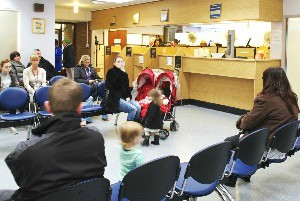NHS England asks GPs to house mental health therapists within practices

NHS England is asking GP practices to house mental health therapists within their practice premises.
New guidance, released today, says practices should offer currently unused space to therapists employed by the IAPT service, or share space they are using for other clinical services with IAPT.
This forms part of the GP Forward View pledge for 3,000 additional mental health therapists to work in general practice by 2021 and comes as GPs are reporting that nearly half of all GP consultations now include a mental health issue.
NHS England said the therapists could then take referrals from the practice’s GPs and other clinical staff, as well as practice patients who self-refer themselves to the IAPT service.
It added that practices should treat the therapists as ‘full members of the primary healthcare team’ by allowing them to attend practice meetings.
Outlining technical options for how GP practices could allow IAPT to use their premises, NHS England said this could include offering up space which is already paid for by the NHS, agreeing with CCGs to offer up space with reimbursement under the Premises Cost Directions, or charging rent from IAPT services on a commercial basis.
NHS England’s national director for mental health Claire Murdoch said: ‘We are on track to deliver 3,000 therapists in primary care, with over 800 in surgeries at the end of last year and this handy guidance should convince those practices that are yet to take the plunge of the benefits.’
RCGP chair Professor Helen Stokes-Lampard said: ‘Having ready access to specially-trained mental health therapists in primary care, who are integrated into the general practice team, has the power to radically change how we’re able to deliver care to our patients, and hopefully improve outcomes for patients with mental health conditions.’
BMA GP Committee chair Dr Richard Vautrey said: ‘Whilst this initiative to base these staff within the surgery building is very welcome, we need to ensure recurrent new funding to support this expansion in the workforce is in place, but also that sufficient therapists are being trained to avoid simply taking these skilled professionals from existing overstretched IAPT services.’
This comes after Pulse revealed last year that despite the promise of 3,000 dedicated therapists working in practices, they would not actually be directly employed by GPs and only some of the new practitioners would work in practices.
Premises options
Use of existing void space
Consider using existing void space across the local estate, already funded by commissioners but left as unoccupied or under-utilised space, would facilitate better utilisation of NHS estate.
Capacity within the primary care estate
Consider current capacity already within the primary care estate where it is not intended or currently approved to be used for the delivery of core primary care services. This may be the case in owner-occupied estate and may provide dedicated facilities or sessional use of clinical, admin or meeting space – all of which may be deemed suitable for IAPT service provision.
Accommodation approved for GMS
Where a practice agrees to host the service in accommodation already approved for delivery of General Medical Services (GMS) and it is approved by commissioners and is eligible for reimbursement of costs under the Premises Costs Directions, the Commissioner will need to agree to the proposed arrangements.
Use of space on a commercial basis
In the event that none of the above is suitable or available, some general practices may decide to offer space which is available on a commercial basis, where they have vacant accommodation which sits outside the approved GMS space and where any tenancy arrangements allow. Where this is an option, the rental charge should be negotiated between the IAPT service and general practice.
Estates funding of extensions and improvements
There may be opportunities to apply for funding to increase the capacity of a practice via the annual capital allocations, termed ‘Business as Usual’ capital funding which is available via NHS England.
Source: NHS England guidance on co-locating mental health therapists in primary care
Pulse October survey
Take our July 2025 survey to potentially win £1.000 worth of tokens

Visit Pulse Reference for details on 140 symptoms, including easily searchable symptoms and categories, offering you a free platform to check symptoms and receive potential diagnoses during consultations.












